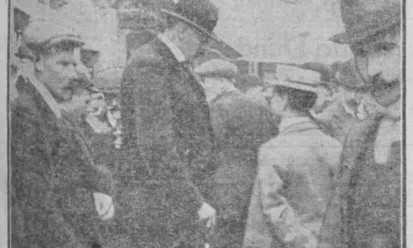A legion of demons held Perth’s mercantile class at its mercy in the late 1700s. They were led by three fiery demagogues who unleashed their wrath at will. The demons were a mob which went into raptures of destruction when meal prices rose. The demagogues were three chancers who exploited the deprivations of the poor for their greedy ends.
Perth was ablaze with social unrest between 1770 and 1777 when oatmeal prices rocketed on the back of poor harvests. In those days, oatmeal was the staple food of the poor. They were completely dependent on it and its three variations, porridge, brose or oatcakes. A dearth in the meal market meant starvation and death to the labour classes.
That is what happened in 1777 during the seventh consecutive lean harvest. As prices rose and children went hungry, farmers and grain merchants were viewed through jealous eyes and then through desperate eyes. Hunger turned to violence as the poor lashed out. It was in this maelstrom that the demagogues spied their chance.
They were an unpleasant strain of humanity, devious and duplicitous, self-appointed representatives of the starving poor. The first was a barber called James Wilson. He wasn’t a looker. The Northern Warder described Wilson as a tall, gaunt, knock-kneed, splay-footed, cadaverous-visaged and ghostly looking personage of slovenly habits. But he did do a neat sideline in illegal wedding ceremonies. The second was Blair Flight, a watchmaker, who also turned his hand to weddings. The third was the mendacious Ned Keillor, small in stature but mighty in his own estimation.
When warmed by whisky, Keillor had a vile, provocative tongue with which he lashed and humiliated others. Ned often went on a days-long whisky binge without a penny, simply by tormenting those with money to fund his drinking. When meal rose a fraction, these three would get up a riot.
Notice would be sent round the weaving shops and the “wabsters” would turn out, aided and abetted by their wives and children. Armed with stones and sticks the rioters would pour along the streets, howling, yelling like demons, according to the Northern Warder, and smashing windows of grain merchants.
The mob was a powerful tool, wielded at will by these brutes. Soon, the demagogues moved on from spontaneous riots to organised raids on farms. Their most destructive outing was to a farm at Elcho. Workers put up a stout defence but the wabsters broke their line. Maddened to fury the mob smashed furniture and plundered the farmhouse of any article of value.
Later in the year the mob sacked meal shops in Perth but scattered when Provost Stewart reluctantly ordered a bayonet charge by soldiers. The wabsters regrouped in Horsecross, but the Provost would not let the soldiers open fire. He gathered Perth’s most prominent citizens to assure the rioters they would do all they could to supply them with meal. At this the crowd went home.
